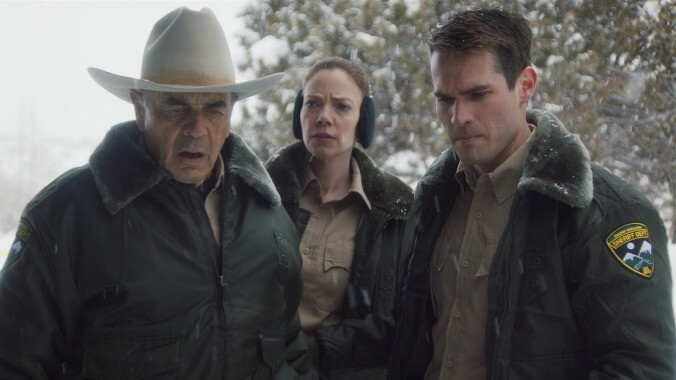Jim Cummings’ inspired werewolf movie The Wolf Of Snow Hollow has way more laughs than scares

Note: The writer of this review watched The Wolf Of Snow Hollow from home on a digital screener. Before making the decision to see it—or any other film—in a movie theater, please consider the health risks involved. Here’s an interview on the matter with scientific experts.
Jim Cummings’ impressive debut feature, Thunder Road, was a discomfitingly funny character study of a Texas patrolman suffering a howling nervous breakdown. So in a way, it makes sense that for his follow-up, The Wolf Of Snow Hollow, the actor, writer, and director should tackle the subject of werewolves. His character, John Marshall, is not all that different from Thunder Road’s Jimmy Arnaud. He’s a frustrated, ineffectual deputy in the mountain community of Snow Hollow, Utah, where his aging father (the great Robert Forster, in his final role) is the sheriff and a serious crime happens once a year or two. That is, until the bodies of horrifically mangled and dismembered young women start showing up every full moon. If it isn’t a bona fide lycanthrope, then it’s at least a serial killer, running loose in the un-idyllic Americana of divorced dads and coroners who vape on the job.
Among the many quirks of this very idiosyncratic comedy is that it really is structured like a thriller or a horror film. (The original, more serious-sounding title, The Werewolf, still appears in the opening credits, at least on the screener provided for this review.) There are gruesome crime scenes, creepy suspects, and audience-implicating killer’s eye point-of-view shots. The hero is pursuing his own theory, no matter the toll it takes on his personal life. But one major difference is that the characters are all Jim Cummings creations, speaking dialogue that is both believable and demented, with a wonderful ear for our awkward verbal reflexes, banalities, and resentments.
In that regard, it represents an improvement on Thunder Road, in which every character except Jimmy Arnaud was one-note. Although John is introduced through one of those deftly written, segueing single-take monologues that distinguished Cummings’ debut, a much larger part of The Wolf Of Snow Hollow is invested in its terrific supporting cast, which includes familiar faces like Forster and Riki Lindhome (who plays another sheriff’s deputy, Julia), and a lot of unknowns. The influence of the Coen brothers is conspicuous, especially their fondness for those characters that could only exist in one specific place.
However, Cummings doesn’t share the Coens’ ironic, distanced worldview. Like his previous film, The Wolf Of Snow Hollow is a semi-sympathetic portrait of a walking disaster—a lawman who lacks the emotional equipment to direct traffic, let alone pursue an investigation that he seems to have cribbed from watching too many serial killer movies. Several sequences pay affectionate tribute to Zodiac, and there’s more than a tinge of David Fincher’s infinitely rewatchable magnum opus in the way John’s life crumbles as he obsesses over the seemingly unsolvable killings.
Part of the fun is watching Cummings (who’s a very gifted actor) navigate his character’s immaturity, whether he’s shouting at his colleagues, correcting himself mid-sentence, or haranguing a librarian for startling him awake after he dozes off in front of a stack of books about werewolves. One thing he’s exceptionally good at is portraying the way people get angry and then keep inventing reasons to stay angry. Which is to say that a lot of the funniest parts of the film come down to psychology.
John’s alcoholism (he’s three years sober) and strained relationship with his college-bound teenage daughter may seem like pure Hollywood cliché, but the script genuinely probes the misdirected resentment he embodies. Although The Wolf Of Snow Hollow isn’t remotely scary (a problem, considering its multiple sequences of women being murdered under moonlight), it does offer some things that are worth being scared of, with a current of darkness that flows alongside the humor. Cummings has something thoughtful to say about werewolves, inner monsters, and maybe even violence, but addressing it would mean spoiling the movie.